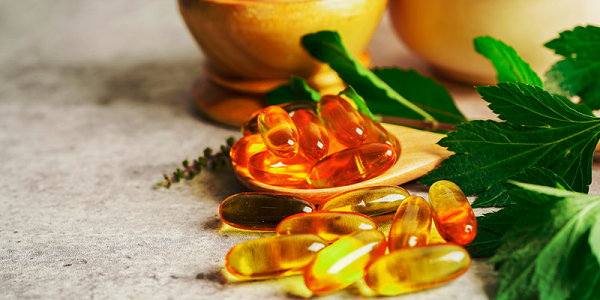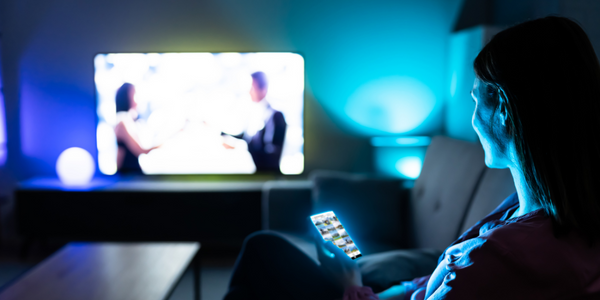
Why You Need Blue Light Skincare in Your Anti-Ageing Skincare Routine
Share
In the ever-evolving landscape of skincare, staying ahead of the curve is essential, especially when it comes to combating the signs of ageing. As we thoughtfully assemble our anti-ageing skincare routines, a new contender has emerged on the scene – blue light skincare. With the widespread use of digital screens in our daily lives, the detrimental effects of blue light on our skin have garnered significant attention. From accelerating the ageing process to causing inflammation and oxidative stress, the need to protect our skin from these modern-day aggressors has never been more pressing.
Join us as we explore the importance of incorporating blue light skincare into your anti-ageing regimen and discover how it can revolutionise your approach to maintaining youthful, radiant skin.
What is blue light and where does it come from?
Blue light, also known as high-energy visible (HEV) light, is a type of high-energy, short-wavelength light that is part of the visible light spectrum. It is emitted by the sun, digital screens such as those found on smartphones, computers, tablets, and televisions, as well as artificial sources like LED lighting and fluorescent bulbs. While exposure to natural blue light during the day is beneficial for regulating our sleep-wake cycle and boosting mood and alertness, excessive or prolonged exposure to artificial blue light, particularly HEV light, especially in the evenings and at night, can have negative effects on our skin and overall health.
How does blue light affect your face?
In today's digital age, our faces are constantly bombarded with blue light emitted by screens of multiple and various electronic devices. While the impact of blue light on our eyes has been widely discussed, its effects on our facial skin are equally significant yet often overlooked. From causing premature ageing to disrupting collagen and elastin production, the implications of blue light exposure on facial health are profound.
Premature ageing
Blue light exposure disrupts the skin's natural repair mechanisms, hindering its ability to regenerate and maintain its youthful appearance. Over time, prolonged exposure to blue light can result in a loss of skin firmness, elasticity, and overall vitality, contributing to premature ageing.
Affects collagen and elastin production
Blue light exposure penetrates deep into the skin, where collagen and elastin fibres are located. The disruption of these fibres by blue light leads to the development of fine lines, wrinkles, and sagging skin, which are characteristic signs of premature ageing. This process occurs due to the formation of free radicals, highly reactive molecules that damage skin cells and accelerate the breakdown of collagen and elastin. As a result, the skin's firmness, elasticity, and overall vitality diminish, contributing to premature ageing.
Inflammation and Oxidative Stress
Exposure to blue light can also induce inflammation and oxidative stress in the skin. Blue light penetrates the deeper layers of the skin, triggering inflammatory responses and generating reactive oxygen species (ROS). These ROS can cause damage to skin cells, proteins, and DNA, leading to oxidative stress. Additionally, blue light exposure can disrupt the balance of antioxidants in the skin, further exacerbating oxidative damage. The resulting inflammation and oxidative stress can contribute to skin ageing, hyperpigmentation, and other skin concerns.
Your skincare can prevent blue light affecting the skin
Full Protection SPF
When browsing sunscreens, check the label for ingredients such as Niacinamide, Gossypium Herbaceum, and Zinc Oxide, which offer physical protection against blue light. Additionally, examine the product label to confirm blue light protection, ensuring comprehensive coverage against environmental stressors.
Antioxidant-Rich Formulations
Incorporating antioxidants into your skincare routine can further enhance protection against blue light-induced damage. Look for skincare products containing ingredients such as vitamin E, and Niacinamide, which help neutralise free radicals and support the skin's natural defence mechanisms.
Hydration and Barrier Support
Maintaining a well-hydrated skin barrier is crucial for protecting against blue light damage. Use moisturisers and serums formulated with hydrating ingredients like Hyaluronic Acid to keep your skin moisturised and resilient.
It’s easy to integrate blue light protection into your existing skincare routine
It's effortless to incorporate SKINICIAN SPF 50 Daily Defence into your morning routine as your last step before makeup. It offers full protection against UVA, UVB, and High-Energy Visible (HEV) light, safeguarding your skin from blue light exposure. Enriched with Niacinamide, Gossypium Herbaceum, and Multi-Molecular 4D Hyaluronic Acid, it hydrates, smooths, and fortifies skin while providing antioxidant benefits to combat free radicals and reduce oxidative stress. Additionally, Vitamin E further protects against skin damage. This lightweight formula also doubles as a primer and won't leave a white cast, ensuring your skin stays healthy and youthful.
Choosing the right blue light skincare products
When selecting blue light skincare products, it's essential to prioritise ingredients known for their protective properties against blue light exposure. SKINICIAN SPF 50 Daily Defence stands out as an excellent choice, offering comprehensive protection against UVA, UVB, and High-Energy Visible (HEV) light. Enriched with ingredients like Niacinamide, Gossypium Herbaceum, Multi-Molecular 4D Hyaluronic Acid, and Vitamin E, it provides antioxidant benefits, hydrates the skin, and fortifies its natural defence mechanisms.

In addition to SKINICIAN SPF 50 Daily Defence, look for products containing antioxidants such as vitamin C, vitamin E, and green tea extract, which help neutralise free radicals generated by blue light exposure. Ingredients like zinc oxide and titanium dioxide provide physical protection against blue light, while peptides and ceramides support the skin's barrier function and repair processes.
By choosing skincare products with these ingredients, you can effectively protect your skin from the harmful effects of blue light and maintain its health and vitality.
Additional Ways to Protect Your Skin from Blue Light
Blue Light Glasses
Consider investing in blue light-blocking glasses, which can help reduce the amount of blue light reaching your skin and protect the delicate skin around the eyes from digital radiation.
Limit Screen Time
Reduce your overall screen time by taking regular breaks from electronic devices. Incorporate screen-free activities into your daily routine to give your skin a break from constant blue light exposure.
Adjust Screen Settings
Many electronic devices now offer settings that allow you to reduce the amount of blue light emitted by the screen. Adjusting these settings, such as using the night mode feature on your smartphone or computer, can help minimise blue light exposure.
Physical Barriers
Create physical barriers between your skin and electronic devices whenever possible. For example, using a laptop stand or holding your smartphone at arm's length can reduce direct blue light exposure to your face.
Here are a few more articles you might be interested in:



